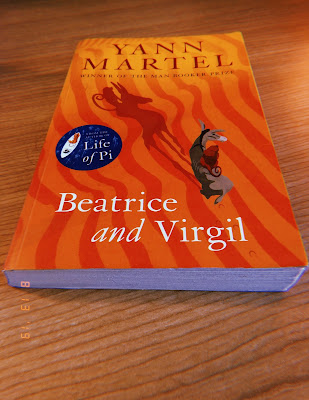Book Review: Beatrice and Virgil by Yann Martel
 Back in early July I went to visit a friend of mine in New Hampshire. While there, she took me to a place that was endearingly called, "The Dump". More pleasant than an actual junkyard though, The Dump consisted of a small, two-room shed filled with various knick-knacks that were free for the taking (a swap shop, of sorts). One room was specifically dedicated to books, and was filled with shelves upon shelves of dusty and worn novels, all of which were completely free of cost (any bookworm's dream!) Upon entering this alluring room, I immediately began to fill my arms with any book that even remotely caught my attention. One of these books just so happened to be Yann Martel's Beatrice and Virgil. In my eagerness to look for more reads, I didn't even bother to read the synopsis on the inside flap, but rather added it to my pile simply because of the vibrant colors of its cover (yes, I went directly against the old proverbial phrase and judged books by their covers, but what can I say? I'm a sucker for visually-appealing cover art). Thankfully in the case of Martel's book, my surface-level judgement turned out to be quite fruitful, as I found myself devouring this novel in less than two days (which is something I haven't been able to do for quite some time).
Back in early July I went to visit a friend of mine in New Hampshire. While there, she took me to a place that was endearingly called, "The Dump". More pleasant than an actual junkyard though, The Dump consisted of a small, two-room shed filled with various knick-knacks that were free for the taking (a swap shop, of sorts). One room was specifically dedicated to books, and was filled with shelves upon shelves of dusty and worn novels, all of which were completely free of cost (any bookworm's dream!) Upon entering this alluring room, I immediately began to fill my arms with any book that even remotely caught my attention. One of these books just so happened to be Yann Martel's Beatrice and Virgil. In my eagerness to look for more reads, I didn't even bother to read the synopsis on the inside flap, but rather added it to my pile simply because of the vibrant colors of its cover (yes, I went directly against the old proverbial phrase and judged books by their covers, but what can I say? I'm a sucker for visually-appealing cover art). Thankfully in the case of Martel's book, my surface-level judgement turned out to be quite fruitful, as I found myself devouring this novel in less than two days (which is something I haven't been able to do for quite some time).Although I knew absolutely nothing about this book prior to reading it, I was fully hooked from the first page on, which I genuinely did not expect. I wish there was a way to discuss this book without spoiling too much of the plot, but I will do my best to reveal as little as possible:
Set in a rather ambiguous location and time period, Beatrice and Virgil tells the tale of a disheartened author named Henry who by chance of fate happens to receive a letter from a very mysterious taxidermist, who insists he is in need of the writer's help. Although hesitant at first, Henry soon becomes lured in to the strange world of taxidermy, befriending a donkey and howler monkey named Beatrice and Virgil along the way. Through his complex interactions with this odd, yet vaguely recognizable world, Henry comes to startling realizations that permanently alter his life.
Throughout this book Martel artfully weaves in beautiful poetic and descriptive language, and even creates stories within stories, all of which completely captivated me (part of the reason it was so hard to put down). Even more than that though, these literary techniques forced me as a reader to critically reflect on every single passage. Each page was teeming with imagery and symbolism, and moral imperatives that were simply impossible to ignore. The motif of duality constantly presented itself in this book, from character personalities, surroundings, and decisions made, which played well into Henry's greater search for truth in the world around him. For me this book was highly unpredictable, and while the ending was certainly not what I expected, I appreciated how it forced me as a reader to actively reflect on all I had just read, and its implications on my own life. At the end of the day, Beatrice and Virgil is a mesmerizing novel that speaks to the importance of storytelling, along with the redemptive power in confronting the truth, in all of its ugliness. In a world that so frequently tries to grapple with the relevance of truthfulness, this novel certainly speaks to this struggle in a way that almost anyone could relate to.

Comments
Post a Comment